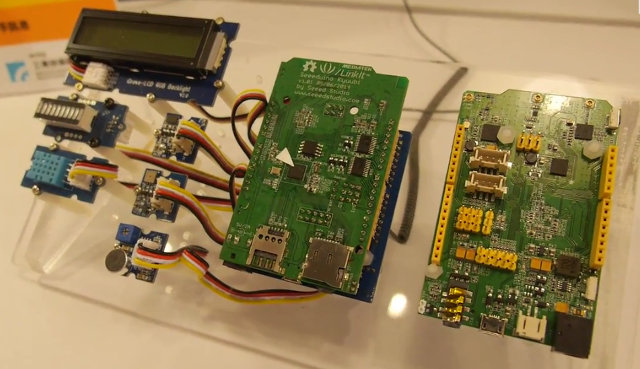Last month, Mediatek announced their Mediatek MT2502 SoC for wearables, codenamed Aster, as well as the Linkit development platform targeting the developer’s community. But at the time they did show the actual hardware, and thanks to Charbax we know have more interesting details about Aster and Linkit.

First they compare a design based on Aster to Samsung Galaxy Fit wearable band, and show why it uses less space, will cost less, and they claim over twice the battery life.
- Simple and smaller design (~36% reduction in size)
- Aster solution – MT2504 (6.2 x 5.4 mm) plus all required resistors, capacitors and inductors require 89.97 mm2
- Galaxy Fit – MCU. Bluetooth Transceiver, external memory, a linear charger, and all required resistors, capacitors and inductors require 140.97 mm2
- Battery life – Samsung Galaxy Fit is supposed to last between 1 and 1.5 days on a charge, whereas devices based on Aster should last about 4 days on a charge during regular usage. This is achieved partially by switching between Mentor Embedded Nucleus RTOS during active use to something called “Tiny System” in suspend where the processor runs at just 24 MHz.
- Lower Cost – The cost will be lower because they integrate all functions, including a modem, into one single chip.
We also learn MT2502 is based on the older ARM7 architecture, and that it can support screens up to QVGA (320×240). So it clearly aims a entry level wearables, similar to the Pebble smartwatch, or Fitness Trackers, and it’s not a candidate to run Android Wear.
LinkIt will be ready in August, and any developers will be able to work on the platform. Mentor Embedded’s Nucleus real-time operating system will stay closed source, but an SDK will be provided, including a plugin for the Arduino IDE, integration with cloud services (baidu and others), and sensor algorithms (Accelerometer, Gravity, Gyro, Magnetometer, HRM, etc…), to allow developers to design their own smartwatch, smart wristband, or other IoT applications. Mediatek previously announced the board would be provided by a third party, which turns out to be Seeed Studio, and the board is called Seeduino Kyuubi. Based on MT2502, Kyuubi board features a micro SD slot, a SIM card slot, a micro USB port for programming, an Audio port, as well as Wi-Fi and GPS via respectively MT5931 and MT3332 chips. It looks to feature Arduino compatible headers letting you connect Arduino shields.
Via ARMDevices.net

Jean-Luc started CNX Software in 2010 as a part-time endeavor, before quitting his job as a software engineering manager, and starting to write daily news, and reviews full time later in 2011.
Support CNX Software! Donate via cryptocurrencies, become a Patron on Patreon, or purchase goods on Amazon or Aliexpress




